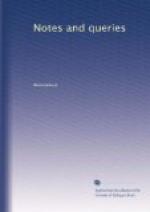Maclane was most probably the “Mac” alluded to by SENEX; but his account differs in so many respects from cotemporaneous records that I have ventured to trespass somewhat largely upon your space. I may add, that I by no means agree in the propriety of erasing a monumental inscription of more than eighty years’ existence without some much stronger proof of its falsehood; for I quite coincide with the remarks of Rev. D. Lysons, in his allusion to this monument (Surrey, p. 393.), that
“Allen was illegally
killed, whether he was concerned in the riots or
not, as he was shot apart
from the mob at a time when he might, if
necessary, have been apprehended
and brought to justice.”
E.B. PRICE.
September 30. 1850.
The Rev. Dr. John Free[2] preached a sermon on the above occasion (which was printed) from the {334} 24th chapter of Leviticus, 21st and 22nd verses, “He that killeth a man,” &c.; and he boldly and fearlessly denominates the act as a murder, and severely reprehends those in authority who screened and protected the murderer. The sermon is of sixteen pages, and there is an appendix of twenty-six pages, in which are detailed various depositions, and all the circumstances connected with the catastrophe.
Sec. N.
Your correspondent SENEX will find in Malcolm’s Anecdotes of London (Vol. ii., p. 74.), “A summary of the trial of Donald Maclane, on Tuesday last, at Guildford Assizes, for the murder of William Allen, Jun., on the 10th of May last, in St. George’s Fields.”
R. BARKER, JUN.
A long account of this lamentable transaction may be found in every magazine eighty-two years since. The riot took place in St. George’s Fields, May 10. 1768, and originated in the cry of “Wilkes and Liberty.”
GILBERT.
[Footnote 1: A foot-note informs us that “a white-wash is put over these lines between the crotchets.”]
[Footnote 2: Dr. Free was of Christ Church, Oxford, and perhaps some of your readers may know where his biography is.]
* * * * *
MEANING OF “GRADELY.”
(Vol. ii., p. 133.)
For the origin of this word, A.W.H. may refer to Brocket’s Glossary of North Country Words, where he will find—




